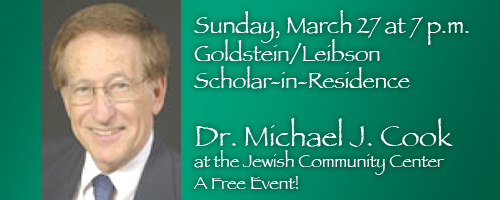
Having the opportunity hear a learned rabbi and teacher speak about the New Testament has many in our community anticipating a most interesting program when Rabbi Michael Cook, Ph.D., addresses the community as this year’s Goldstein/Leibson Scholar-in-Residence on Sunday, March 27, 7 p.m. at the Jewish Community Center.
His topic will be “Jews, Jesus and ‘Gospel Dynamics’” The Future Is No Longer What It used to Be.”
“There are questions about the New Testament our community has avoided for centuries,” says Cook, “and much to our detriment.”
He explains that the rabbis of Talmudic time (first through sixth centuries, C.E.) were the ones to declare the Gospels off-limits for Jews. He feels on this one matter, however, the advice of our sages back then turned out not to be “sage advice” for the Jews of today.
The history of the Crusades, with a destination of Jerusalem, included the persecution of “non-believer” Jewish communities along the way and brought on the sporadic massacres of Jews in the “name of Jesus Christ.”
Cook says that although many Jews do not believe the New Testament itself caused the Holocaust, they do insist the Shoah could not have happened without it. Such experiences have made Jews fearful of the mere mention of Jesus’ name.
He says, therefore, that engaging in the New Testament could be both therapeutic and empowering for Jews. A willingness by Jews to tackle the New Testament could help them enlighten Christians about the role the text played in violating some of their own values. Therefore Jews would be in a better position to interpret the words from a Jewish perspective and help combat how they have been misunderstood in modern society.
In order to accomplish this, Cook says Jews must master not the New Testament itself, but what he calls “Gospel dynamics,” the ways in which early Christian traditions were molded or even created decades after Jesus’ ministry. Since outside of Israel, Jews live in Christian-majority countries, he questions how many Jews could answer knowledgeably when Christians pose theological questions such as: “Why won’t the Jews accept Jesus as the messiah” or “Why don’t Jews just accept Jesus and remain Jewish?”
Cook finds Jews’ inability to answer such basic questions hard to reconcile because of their sophistication and high regard for education. He believes their self-imposed lack of knowledge of the New Testament has put them at a disadvantage at this point in time, when Jewish-Christian relations are playing in policymaking whether involving Middle East politics, church-state issues or religion in the public square.
These situations, he believes, erase any doubts about whether understanding Gospel dynamics should be a pressing issue for Jews. So too is the fact that the future of Christianity lies heavily in the Third World, where New Testaments are being distributed for the very first time, meaning that some of the same problems Jews faced because of the New Testament in previous centuries may be in the offing.
[by Phyllis Shaikun]


